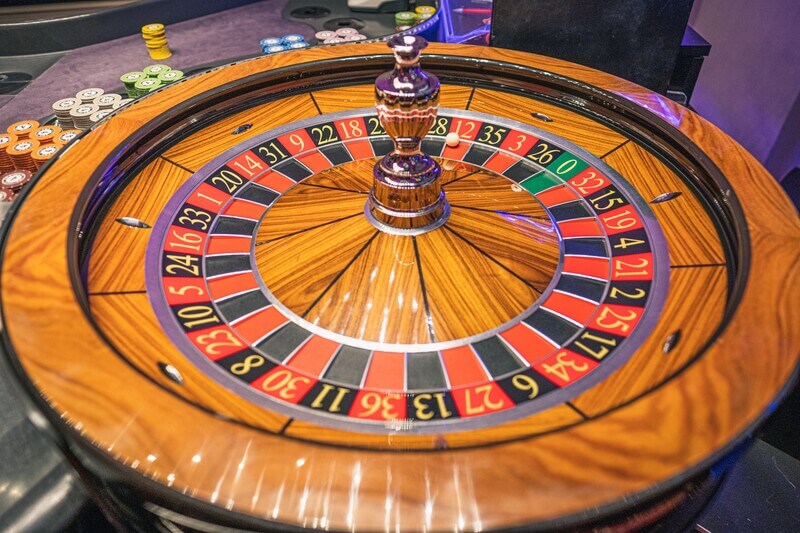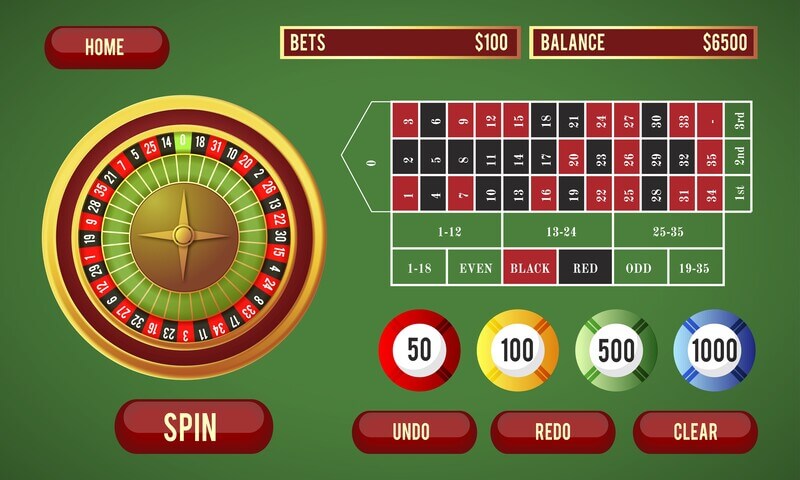Roulette, an enchanting and iconic game in casinos worldwide, has a rich heritage spanning numerous centuries. Exploring the history of roulette and the development of this table game not only enhances our admiration for its timeless allure but also provides valuable insights into its tactics and gameplay. Starting as a mathematical experiment by Blaise Pascal and evolving into a global sensation, the history of roulette embarks on a captivating journey, showcasing the game’s transformation and its profound impact on the realm of gambling.
Within this comprehensive guide, we delve into the captivating history of roulette, its origins, the diverse historical variations, its voyage to America, the emergence of online roulette, and the contemporary trends that shape its future. Join us as we uncover the fascinating history of roulette, revealing the secrets behind its enduring popularity.
Origins of Roulette
The true origins of the game called ‘roulette’ remain veiled in mystery. The most commonly embraced narrative suggests that the initial iteration of the game was crafted by the French mathematical genius and notable intellectual Blaise Pascal during the 17th century. It is believed that he conceived the game while engrossed in his pursuit of inventing the perpetual-motion machine.
Nevertheless, evidence indicates that various ancient civilizations engaged in games bearing resemblances to roulette marks the beginning of the history of roulette. Let us explore a few intriguing instances from world history’s diverse and captivating annals.
The invention of the Roulette wheel
The creation and history of roulette can be attributed to an unexpected figure: the mathematician Blaise Pascal. Interestingly, Pascal intended not to devise a gambling apparatus but to invent a version of a perpetual motion machine. This theoretical device was envisioned to operate perpetually without requiring an external energy source.
While the roulette wheel fell short of achieving perpetual motion, it found its true calling as a remarkable tool for gambling. Its eventual halt proved very characteristic, making it an excellent instrument for games of chance.
Influence of Roulette Games
Roulette’s impact on the broader entertainment industry has been substantial. One can readily discover content that draws direct inspiration from the game and elements that bear a loose influence. Moreover, the offerings of the casino world have made notable appearances in various realms of mainstream entertainment, such as films, television shows, and gaming.
Developers of console games have frequently turned to roulette as a go-to option when seeking to incorporate captivating mini-games into more significant titles. This choice has proven to be a compelling addition, enhancing the overall gaming experience.
The lasting impact of roulette can also be observed in the music industry. Artists frequently employ the game and its themes to evoke a sense of an enigmatic future. The choice to incorporate roulette in their creative works is likely due to its relatability and recognizable nature, resonating with listeners on a familiar level.
Variations of Roulette
Throughout the traditional history of roulette, it has been predominantly played in two primary variations: European and American. These two games differ primarily in terms of odds, and we will explore their distinctions in detail. Furthermore, another commonly encountered variation is called French roulette, also online renditions like mini roulette.
The French connection
In the history of roulette, you will learn that French roulette, much like its European counterpart, bears striking similarities in gameplay. However, there is a slight distinction in the layout of the betting board. Despite this difference, the available betting options and corresponding payouts remain the same, with only a single zero. What sets French roulette apart is the inclusion of the “La Partage” rule, which grants an advantage to players. According to this rule, if the ball lands on zero, players who have placed even money bets receive back half of their initial wager.
This rule enhances the player’s odds, making French roulette an even more fair game than European roulette. Some variations of the game also feature the “en prison” rule, allowing players to imprison their even money bets if the ball lands on zero. When a bet is imprisoned, it remains on the board for the subsequent spin. The player reclaims their original stake if the bet wins on the next spin. However, if the bet loses, it is forfeited entirely.
Single zero and Double zero Wheels
The history of roulette introduces us to the single zero and double zero roulette wheels, referring to the different variations of roulette wheels based on the number of zeros on the roulette wheel. Single or double zero on the wheel affects the game’s odds and potential payouts. Players should be aware of the roulette wheel used when placing their bets.
Single zero roulette wheel: Also known as European roulette, this wheel has 37 numbered pockets, including 1 to 36 and a single zero (0). The single zero pockets are usually colored green. Regarding odds, only one zero gives players a better chance of winning than double zero wheels. It is commonly found in European and online casinos.
Double zero roulette wheel: Also referred to as American roulette, this wheel consists of 38 numbered pockets, with numbers 1 to 36, a single zero (0), and a double zero (00). The addition of the double zero pockets sets it apart from the single zero wheels. Both the single zero and double zero pockets are usually colored green. The double zero wheel increases the house edge, resulting in slightly lower odds for players than the single zero wheels. It is primarily used in American land-based casinos.
Spread of the Game Across Europe
The history of roulette shows that the game gradually spread across Europe after its inception. The popularity of roulette continued to grow across Europe, with the game becoming a staple in land-based casinos and a favorite pastime for players of various backgrounds. The spread of European roulette across the continent significantly established it as one of the most iconic and beloved casino games worldwide.
One of the main reasons for roulette’s popularity is the lower house edge, standing at 2.70%. This factor contributes to better odds for players compared to other variations. Additionally, European roulette tables in online casinos offer different minimum and maximum limits, accommodating players with varying bankroll sizes. This allows individuals to find a suitable variation that aligns with their budget.
Online Roulette
The advent of online roulette has transformed how we engage with this timeless casino game, delivering the exhilaration and anticipation of the roulette wheel to players worldwide. The convenience of online access, coupled with a vast array of betting options and immersive graphics and gameplay, has firmly established online roulette as a favored pastime among gambling enthusiasts. Whether you’re a pro player or new to the game, understanding online roulette’s strategies, odds, and variations can significantly enhance your winning in Roulette games. By embracing the rich history of roulette, staying abreast of the latest trends, and honing your skills through dedicated practice, you can embark on a thrilling journey, spinning the virtual wheel and pursuing those elusive winning numbers.
Roulette on Digital Era
The history of roulette started with the game’s simple features, evolving to the digital era that has ushered in a new dimension for roulette, revolutionizing the game in unprecedented ways. Online casinos and digital platforms have made roulette accessible anytime, anywhere, eliminating the need for physical casino visits. Cutting-edge technology has brought realistic graphics, immersive sound effects, and interactive gameplay to the virtual roulette experience. Moreover, the digital landscape has introduced innovative variations, such as live dealer roulette, where players can engage with real croupiers through video streaming.
Mobile compatibility further amplifies the convenience, allowing players to enjoy roulette on mobile devices and smartphones. The digital era of roulette has expanded its reach. For instance, Casino Monte Carlo in Monaco has introduced several digital roulette terminals, captivating a global audience and propelling the game into the future of gambling entertainment. The digital era of roulette has transformed the way people engage with the game, offering a dynamic and immersive online experience that rivals traditional forms of play.
Rise of Online Roulette Platforms
The ever-evolving nature of the internet has brought forth a new era for playing roulette online. The advantages of online roulette are abundant, with round-the-clock availability and the ability to access American and European versions of the game regardless of location. Advancements in computer technology have paved the way for exciting variations such as Multi-ball Roulette, Pinball Roulette, Multi-Wheel Roulette, and Mini Roulette, offering a wide range of gaming options to cater to diverse preferences.
Live roulette emerged to address the lack of interaction in online gaming, aiming to recreate the immersive atmosphere of brick-and-mortar casinos. Initially streamed from physical casinos, live roulette allowed players to bet on real-time games, with the winning numbers determined by an actual roulette wheel. However, technical challenges like camera quality and internet connectivity were prevalent.
Fortunately, by 2006, dedicated live casino studios were introduced, resolving these issues. The streaming quality, camera angles, and overall experience improved significantly, with real-life croupiers overseeing the games. Players could enjoy close-up shots and multiple viewing angles, simulating the sensation of being physically present at the casino.
Modern Roulette Trends
The history of roulette, one of the most iconic casino games, dates back centuries. But even with such a storied past, roulette continues to evolve and adapt to the modern gambling landscape. As technology advances and players seek new and exciting experiences, the world of roulette has embraced innovative trends that enhance gameplay, improve accessibility, and offer unique twists to the traditional game. Modern roulette trends have taken the game to new heights, from live dealer roulette and virtual reality experiences to mobile gaming and unique variations. In this article, we’ll delve into the exciting world of modern roulette trends, exploring the latest innovations and discussing how they have transformed how we play and enjoy this beloved casino classic. So, be ready to uncover the cutting-edge trends shaping roulette’s future.
Variations of Online Roulette Games
Aside from the roulette variants mentioned above, there are other online roulette variants that make the game more interesting. These variants include:
- Marvel Roulette
- Multi-Wheel Roulette
- 3D Roulette
- Double Ball Roulette
- Pinball Roulette
- Lucky Star
Influence of Live Dealer Roulette
The history of roulette with live dealers started in the late 1990s but faced significant technological limitations, resulting in minimal impact. Internet speeds and quality at the time needed to be improved to handle the demands of live streaming. However, by the mid-2000s, advancements in internet technology made live dealer casinos more feasible. Early versions in 2006 and 2007 showed improved success. Despite this progress, the technology still fell short of the required standard, and the rise of less bandwidth-heavy online gambling experiences like slots overshadowed live dealer casinos. Nevertheless, technology continued to advance, and live dealer casinos made a comeback, utilizing modern graphics processing and streaming quality. They have become a staple feature across major online gambling platforms, and their presence is set to improve further as technology continues evolving.
Global Popularity in Online Casinos
Roulette gained global popularity in online casinos especially in India Casino due to several key factors. Firstly, the convenience and accessibility offered by online platforms allow players worldwide to enjoy the game at any time and from any location. This eliminated the need for physical travel to land-based casinos. Tracing the history of roulette, the online version of the game has gained global popularity because of advancements in secure online payment methods and encryption technologies, ensuring safe transactions and player protection. The combination of convenience, variety, immersive experience, enticing bonuses, and secure gameplay propelled roulette to gain widespread popularity in the online casino industry, attracting a global audience of roulette enthusiasts.


